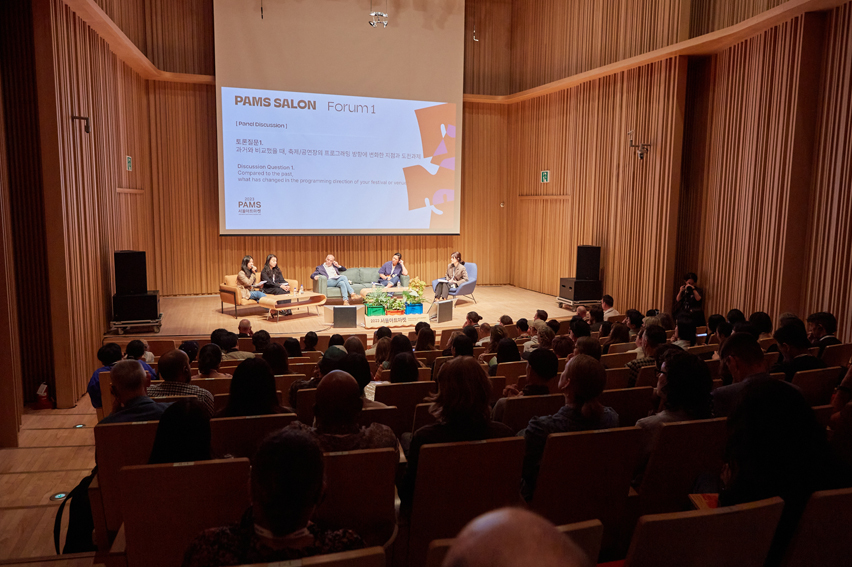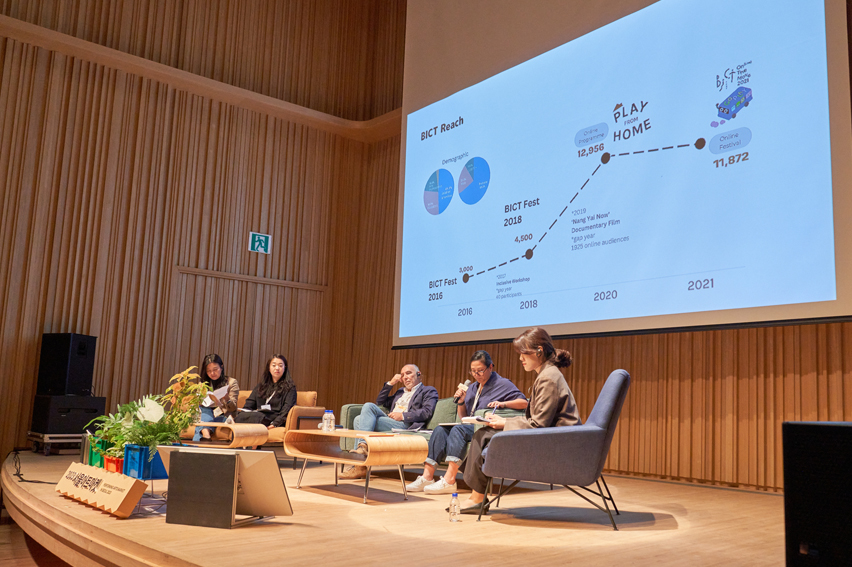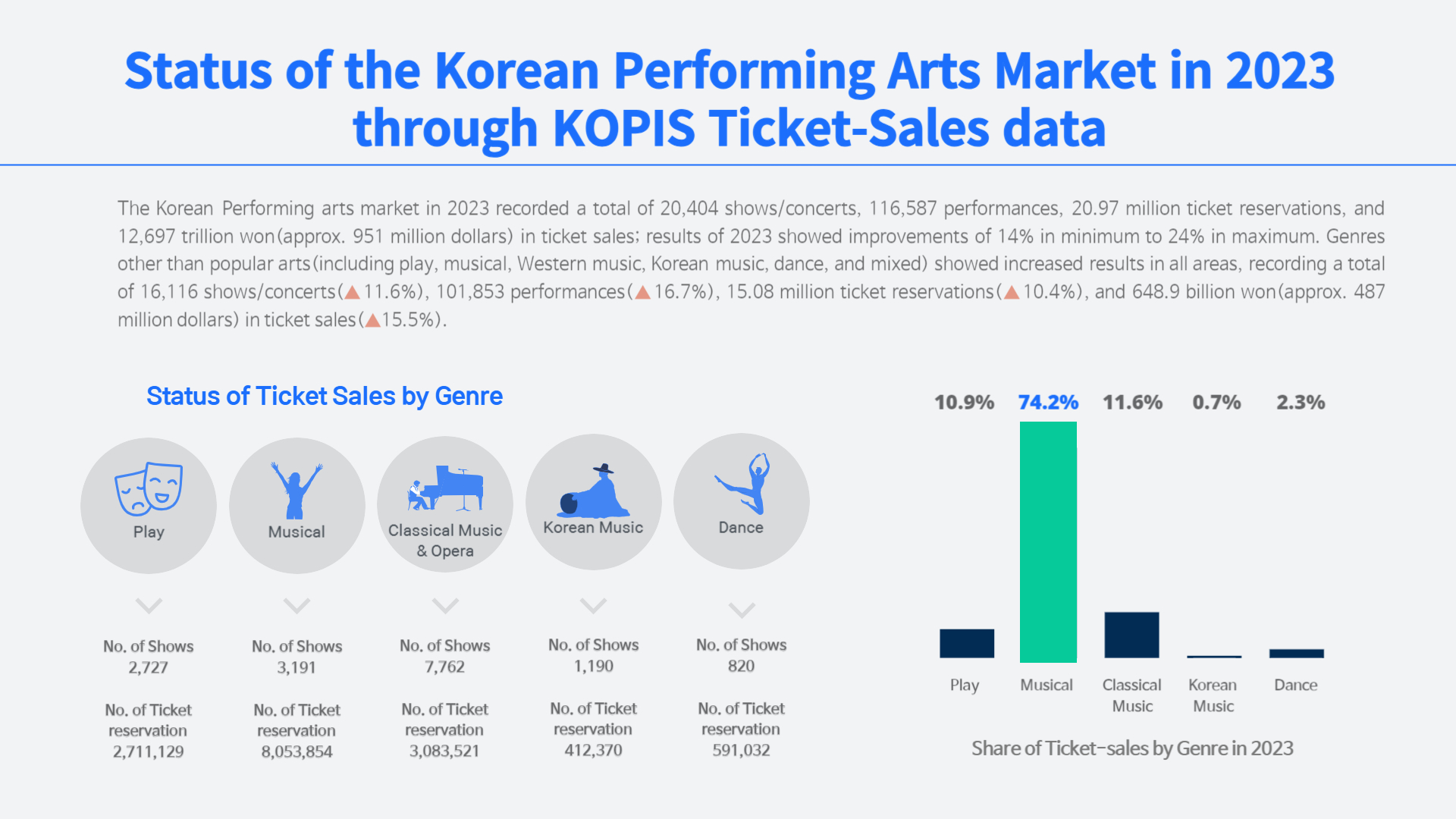International Distribution and Collaboration
GeumJu Kim (Journalist of the Korean Theatre Review)
The Performing Arts Market in Seoul (PAMS), recognized as the largest international platform for the distribution of performing arts in Asia, convened from October 11th to 14th, in partnership with Journey to Korean Music, a platform dedicated to the overseas dissemination of Korean traditional music. This event transpired at esteemed venues, including the National Theater of Korea, Seoul Namsan Gugakdang (Korean Traditional Music Hall), and the JCC Art Center. Organized by the Korea Arts Management Service(KAMS) and graciously sponsored by the Ministry of Culture, Sports and Tourism, along with the Korea Arts Management Service, the 19th iteration of PAMS, framed under the thematic pillars of 'Sustainability,' 'Circulation,' and 'Cooperation (Re-connected),' attentively observed the nuanced transformations unfolding across diverse strata within the performing arts realm post the pandemic.
This year, PAMS returned to an entirely face-to-face format for the first time in three years, attracting over 1,000 Korean and international performing arts professionals from 36 countries to participate in diverse programs. Monthly magazine 'the Korean Theatre Review' had the privilege of attending the on-site proceedings of the 'PAMS Salon- Forum I,' centered around the core themes of the 2023 Seoul Arts Market, specifically focusing on 'Towards A Sustainable Performing Arts Sector: Current Tendency and Changes in International Relations and Cooperation.' Yena Kang, Team Lead of Performing Arts International Development Team at the Korea Arts Management Service assumed the role of moderator for the forum. Esteemed panelists included Adjjima Na Patalung, Festival Director of the Bangkok International Children’s Theatre Festival; Frédéric Mazelly, Artistic Director of Parc de La Villette in France; Hyeri Kim, Producer at the Wooran Foundation; and Youngsun Cho, Director of Programming at the Seoul Street Arts Festival. Together, they engaged in presentations and discussions under the overarching theme of 'the inbound and outbound programming directions of high-profile festivals and performance venues worldwide.'

Civilian Festivals in Thailand: Bangkok International Children’s Theatre Festival (BICT Fest)
Taking the stage as the first presenter, Festival Director Adjjima Na Patalung elucidated on the programming strategy and planning direction of the Bangkok International Children’s Theatre Festival (BICT FEST).
According to Adjjima Na Patalung, the 'BICT Festival' commenced in 2016 and is a biennial international children's performing arts festival held in Bangkok. It is characterized as a medium to small-scale festival and a private independent event. The festival takes place every even-numbered year, and in the odd-numbered years when the festival is not held, programs such as 'BICT On the Move' and 'BICT Bridge' are conducted.
Firstly, the BICT Festival selects artistically significant works based on diversity, aiming to broaden perspectives on Thai children's theater. The festival does not operate its own venue; instead, it leverages a network to host events in partner spaces. BICT On the Move is a mobile theater project that extends beyond urban and traditional theater spaces, bringing theater to areas outside Bangkok and marginalized communities. BICT Bridge is a creative exchange project that connects Thai artists with international artists to develop new collaborative projects. In addition to artist-to-artist pairings, it also facilitates connections between artists and NGO networks to implement various projects for the local community.
Public Spaces in France: Parc de La Villette, the Largest Multi-Cultural Space in Paris
Continuing, Artistic Director Frédéric Mazelly proceeded to elaborate on the public multi-disciplinary arts space in France, 'Parc de La Villette.‘
According to Frédéric Mazelly, La Villette is a park and multi-cultural space located in the northeastern part of Paris. Being the largest park in Paris, it is surrounded by more than 80 diverse communities. This, in turn, implies that La Villette caters to culturally diverse audiences. Therefore, La Villette undertakes various projects that embrace diversity. Furthermore, as La Villette receives half of its budgetary support from the Ministry of Culture, it can be regarded as a public institution. As a public cultural institution, La Villette has three main missions.“
Firstly, La Villette produces and disseminates new attractions and exhibitions across various fields. The cultural program at La Villette encompasses the entire spectrum of the arts and has showcased performances not only in indoor theaters but also in outdoor venues, showcasing unique and rarely-seen artistic expressions. Secondly, La Villette provides sustained support for creativity throughout the year. A primary goal at La Villette is to foster creativity through residency programs. Annually, over 130 theater companies from both France and abroad engage in artistic endeavors within various studios situated within the park. Selected artists collaborate with expert teams, receiving guidance and comprehensive support, both financially and technically. Thirdly, La Villette is dedicated to enhancing accessibility to ensure that culture is accessible to all audiences. The improvement of accessibility stands as a paramount mission at La Villette, with a focus on diverse audience development and public education. Anchored by the powerful axes of the park, its surrounding environment, and cultural programs, La Villette undertakes numerous initiatives to elevate the diversity of its audience."
Private Foundation in Korea: Wooran Foundation
The third presentation was delivered by Hyeri Kim, Producer at the Wooran Foundation, offering an overview of the projects and initiatives presently undertaken by Wooran Foundation.
According to Hyeri Kim, Wooran Foundation, established in 2014, operates as a 100% privately funded non-profit cultural institution. Its programs are bifurcated into two major categories: exhibitions and performances. Functioning with a theater-like character, the foundation operates an exhibition hall, a black box theater, and two creative studios.
In the realm of exhibition programs, the foundation places a thematic focus on traditional Korean crafts. The primary aim is to engage in collaborative ventures with emerging artists, fostering novel interpretations and discovering inherent meanings and values associated with traditional Korean crafts. The performance program, guided by the foundation's distinctive perspective, fundamentally aims to contribute to the diversity of performing arts accessible to domestic audiences. This is achieved by introducing outstanding performances with contemporary thematic awareness or innovative expressive methods, allowing audiences to appreciate the richness of performance arts. Simultaneously, the foundational goal is to test the sustainability of these works. Conducted through developmental and production performances, the program also involves presenting performances by exceptional international artists invited to showcase their work in the domestic sphere.
Public Festivals in Korea: Seoul Street Arts Festival
The final presentation was delivered by Youngsun Cho, Director of Programming at the Seoul Street Arts Festival. According to Youngsun Cho, the Seoul Street Arts Festival began in 2003 under the name 'Hi Seoul Festival' and has continued since its rebranding as the Seoul Street Arts Festival in 2013. As an art festival, it strives to prioritize street arts performances with high artistic quality and works that guarantee artistic imagination. However, as a public arts festival, it also places significant emphasis on securing popularity and diversity. While initially focusing on street arts with elevated artistic merit, efforts are made to ensure accessibility and diversity as a public arts festival. The festival extends beyond theater-based genres, exploring new projects through collaborations with experts in visual arts or architecture, aiming to offer new perspectives on the city.
If there is a distinguishing feature of the Seoul Street Arts Festival compared to other street arts festivals, it lies in the presence of the 'Seoul Street Arts Creation Center (SFAC).' This dedicated space provides artists with a systematic environment to develop and advance their works. The existence of such a space allows the festival to incorporate showcase works from residency programs or presentations by emerging artists as a distinct section within the festival, setting it apart from other festivals.

Discussion 1: Changes in Programming Direction and Challenges in Festivals/Venues Compared to the Past
As the four presenters concluded their prepared remarks, the discussion commenced with the first topic: “Changes in programming direction and challenges in festivals/venues compared to the past.” In response to the question regarding the differences and challenges since the onset of the pandemic, Director Adjjima Na Patalung answered as follows
“Even before the pandemic, challenges existed. The field of children's theater in Southeast Asia, for instance, was not as vibrant. The changes brought about by the pandemic can be seen as amplifying pre-existing difficulties. BICT On the Move and BICT Bridge are international collaboration/exchange programs that were already in place before the pandemic. However, the significance and relevance of these programs have become even more pronounced due to the pandemic.
In Thailand, art festivals are predominantly in the private sector, with limited reliance on public funding. As a result, we often organize numerous networking sessions to discuss how we can collectively move forward. These discussions revolve around exploring avenues for skill-sharing and collaboration to enhance the prospects for the future.“
While Director Adjjima Na Patalung emphasized the importance of networking, Youngsun Cho, Director of Programming at the Seoul Street Arts Festival, expressed that the festival is planned with a focus on “a direction where one can tell stories they want to tell, rather than following typical works.”
“The pandemic prevented us from holding the festival in Seoul Plaza until 2021, but we resumed the festival from 2022. The most crucial question was what stories to tell to the audience gathering once again in the plaza. Until 2022, there was still a lingering psychological constraint about gathering, and I thought that this year might be the first year after COVID-19 where people can open their hearts and enjoy the festival. In that sense, we decided on the theme of the festival as 'Circle' ('Won' in Korean). 'Won' can be translated as 'circle,' representing unity in the festival; it can also mean 'one,' symbolizing the oneness of the festival; and it can be the origin or 'Won' of the festival. Reflecting on the festival's origins, we pondered what the festival should truly convey and what street arts should tell. As a result, we curated works that embody the direction of telling stories we want to tell, rather than adhering to typical works.”
Discussion 2: Cases and Collaborative Strategies of Incubating, Joint Production, and Inviting Domestic and International Artists in Festivals/Performance Venues, Leading to Artwork Distribution, and Collaboration Approaches
The second discussion topic was "Cases and collaborative strategies of incubating, joint production, and inviting domestic and international artists in festivals/performance venues, leading to artwork distribution, and collaboration approaches." In response to questions about cases where domestic and international collaborations have resulted in artwork distribution and collaboration approaches, Frédéric Mazelly provided the following answers.
“France receives substantial support from public institutions. There are many opportunities to receive financial support through various institutions. Due to the ease of collaborative projects, there is a significant amount of collaboration within France, and we also collaborate with European partners whose systems are quite similar. Therefore, at the moment, no specific cases come to mind. Financial support from the private sector is not as prevalent in the European market.”
Hyeri Kim, Producer at the Wooran Foundation, cited the collaboration with the Physical Theatre Troupe 'Theatre RE' from the United Kingdom as the best example, encompassing incubation, joint production, invitation, and distribution.
“The best example of collaboration, spanning incubation, joint production, invitation, and distribution, is the work ‘the Nature of Forgetting,’ introduced by the UK's Physical Theatre Troupe 'Theatre RE‘ We have been in a collaborative relationship since 2019, and the piece was initially showcased at the Edinburgh Festival Fringe. Subsequently, we organized a national tour for the performance in South Korea. We were involved as joint producers from the invitation to ’The Best Play' and continued the collaborative production process with the completed work.
This year, we also introduced the new work
the Korea Arts Management Service is planning to conduct the ‘Center Stage Korea 2024 international open call’ at the end of this year based on the negotiation contents from the PAMS and Journey to Korean Music events. Overseas institutions with plans to invite Korean performing arts groups to perform in overseas venues and festivals can directly apply for the open call.
* This article was jointly published on The monthly magazine Korean Theatre Review and the performance information platform TheApro by the Korea Arts Management Service.
 |
GeumJu Kim Geumju Kim graduated from the Department of English Translation and Interpretation at Hankuk University of Foreign Studies and completed a master's degree in English literature at the same university, specializing in playwriting. Until November 2023, she worked as a reporter for the monthly magazine "Korean Theatre Review," and currently serves as a freelance journalist. During her time as a reporter, she conducted interviews with the American experimental theater group 'Living Theater.' Additionally, she translated an article titled "Reflections on Place in Telematic Performances" for the 2023 autumn issue of "Theatre Critics“ magazine. |








 PREV
PREV

.jpg)
.jpg)
.jpg)
.jpg)











